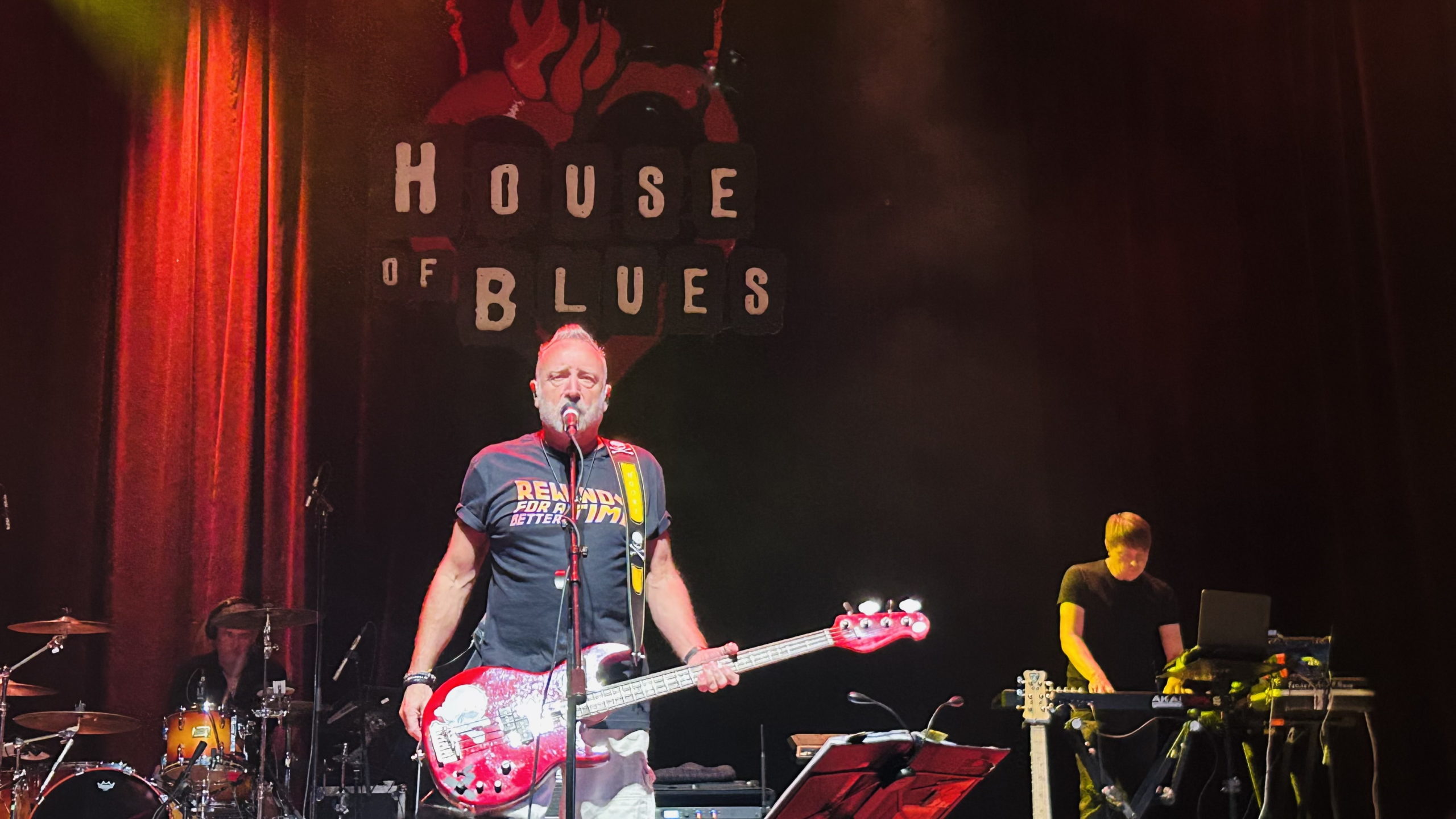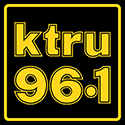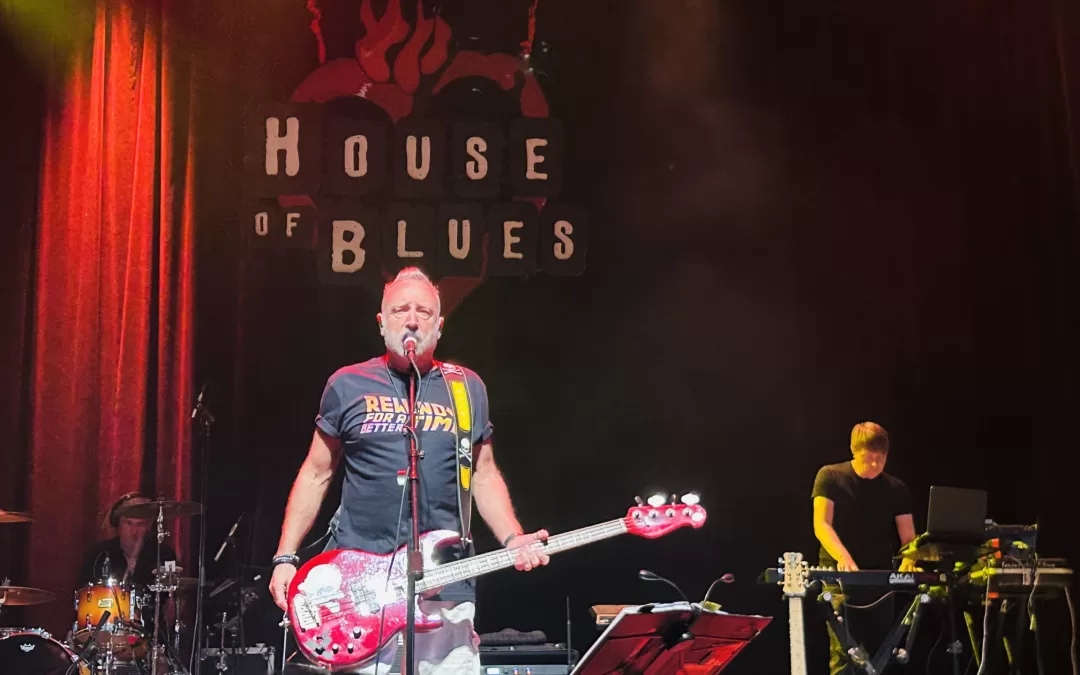By Steven Burgess
Peter Hook, co-founder of legendary bands Joy Division and New Order, revolutionized post-punk and electronic music. Since his time in these iconic groups, Hook has collaborated with artists such as Gorillaz, authored multiple books, and formed Peter Hook and The Light, a band dedicated to performing Joy Division and New Order songs live, with Hook himself taking on lead vocals. At the time of this interview, he was on his Substance tour, bringing the raw energy of these timeless songs to audiences around the world.
Q: 50 years ago… At Manchester Lesser Free Trade Hall, the Sex Pistols played… what was different about them that was unlike any other act at the time?
A: The Sex Pistols were interesting because they were very young, like me… I'd been to see Deep Purple, Led Zeppelin, Black Sabbath, all those bands in 1973-76… I said to Bernard… that we should go and see them… It was £0.50 to get in.
When the Sex Pistols came on, their attitude was completely unlike any other group I'd ever seen… They really weren't interested in you, and Johnny Rotten in particular, spent most of the time telling everybody to f-off… And the 40 people that were there were like, what the hell is this?... And I thought, “you know what? I could do that.” And so, at the end of the gig, I said to Bernard… we should form a group.
I didn't play an instrument. I had no instrument. He had a guitar, but he didn't play it. And we formed a punk group on the way out. So that's how inspirational that performance was compared to everything you see. The thing about [a band like] Led Zeppelin is… I didn't feel like I could do that… I never felt for one moment that I could play bass like John Paul Jones or do anything that the others could do. You know, they were so far above me, it was ridiculous.
When I saw Johnny Rotten, Glen Matlock, Paul Cook and Steve Jones play, I felt for some insane reason that I could do it, which, as it turned out, which is uncanny, was true and weird… The other 40 people… went on to form their own groups too.
Q: In your book, Unknown Pleasures: Inside Joy Division, you talk about how you accidentally learned bass and played with three fingers originally… did you ever feel pressure to play more traditional style?
A: I taught myself how to play just by listening to [other] bands. So did Bernard. We bought a couple of books but couldn't be bothered to read them, so we just stuck with the old punk ethic of… playing anything really.
I always [play with three fingers] because [my ring finger is] my weak finger. So I always push it down with my [middle finger]. Very strange habit. And even now, as you said, after 48 years I've been playing… I still do it.
In the 80s… popping [on bass] was really big… I thought that it would be better for me to learn popping… A very good friend of mine called Donald Johnson, who was in another band (A Certain Ratio) that was on Factory Records… gave me one lesson and he said “Okay, you play with three fingers… you make a wonderful sound with those three fingers… Get on with what you do best.”
I'm very lucky to have a very unique sound… I was very lucky to be able to inspire not only Ian Curtis, but also, New Order to [use bass] as a lead instrument… The melody of the vocal came from the bass…
If someone rips me off, I always take it as a compliment. A lot of my friends will send me [a track and tell me] “the kid sounds just like you.” I always take it as a compliment because when I went to see the Sex Pistols and I was watching Glen Matlock… It wasn't anything to do with music. It was about the simple confusion that you felt as a kid, of not knowing what your life was going to come out to. Of being told what to do and having your path sort of chosen for you. It was that rebellion that you felt at that age was what gave me the courage to grasp that chance.
Hooky on the early formation of Joy Division:
Every one of my friends that I told we went to see a group and now we've formed a group… [said], “You? I've never known anybody as unmusical as you in my life. In fact, the only other person I know that is unmusical as you is Bernard.”
And don't forget, we'd never written a song before, never. And we had to sit there and learn how to write songs… It was absolutely crazy… It was not easy to build a following. It was not easy to write great songs. Luckily, once we met Ian Curtis, which I met him at the third Sex Pistols gig… and [when] we met him at that gig and he said, “oh, are you in a band?”
Because everyone was in the band. And we went, “…we've got a band, me and Bernard, I'm on basses and he’s on guitar.” [Ian] said, “I've got a band… we've got a guitarist and a drummer. We're looking for a bassist.” So, I thought, well, I'm not leaving [Bernard]… It was only when Ian's drummer left that he phoned up and said, “oh, you know, the drummer is gone. And the guitarist is gone with him… Should we join up?” We said, “yeah.” And, you know, the rest is history.
Then we wrote a load of songs together. [Joy Division] got better and better, and I mean, it is amazing to think that by the age of 20, Bernard and I had already written the music for Unknown Pleasures, and Ian had written some of the songs.
Hooky on the formation of Peter Hook & The Light:
When New Order split up in 2007, the atmosphere in the group was very negative about everything. We didn't play much. We weren't happy. We never played anything to do with Joy Division. We never played most of New Order's music. There was a marked reluctance to do anything in it, and it was very frustrating for me and very saddening… I was happy when we split up, to be able to enjoy what I was doing again.
As soon as I was outside of New Order… I stood there and I thought, why do we never celebrate anything to do with Joy Division? Why [did] we never celebrate one year, ten years, twenty, twenty-nine? And I thought, you know what? I'm f***ed if I'm going to let thirty go… I thought how am I going to do it?
I was very happy to find a way to be able to play the music to people who liked the music, just like me… Chances were pretty low that you'd be one band that changed the world. Never mind two, that changed the world, you know? So I was somebody up there and I suspect it's Ian Curtis that really, really likes me, you know, and he's looking out for me in some way or other.
I love the music. I'm very proud of it, and I'm very proud to be able to sit down with anybody who wants to listen to it… and to have gone through the 14 years that we've been playing as [Peter Hook &] The Light and watch it get bigger and bigger.
My ambition was to play every song that Joy Division ever wrote and recorded, which I have done, which we played in one concert. We played fifty-four songs in one concert… in one concert in the church that Ian Curtis used to attend when he was a kid, and he was a choirboy in that church, and we did it for charity… we played to 500 people in this church… people wanted to be a part of that.
My next ambition is obviously to play every song that New Order have written and recorded, which I'm well on the way to do it. We've done I think we've done seven or eight LPs and now… I've got three more New Order LPs to transcribe and play to my friends. Yeah. The audience, that's it… The Light [and I] can actually play upwards of a hundred songs. When I was in New Order, when we were together, we could only play about 17.
After losing that music for so long… I'm watching [Joy Division] and the myths grow and the following, and the people… who love the music and loved Ian's vocals and his melodies and his words, his message, you know, it was wonderful to be able to.
It was scary singing [Ian’s] words to Joy Division's music… I was terrified. I didn't know what people would think. I didn't know whether I'd… pelted with rotten tomatoes or whether people [would] just disappear. I had no idea. But yeah, to work through that and get to the point where I could actually enjoy what I was doing, and also find a new love for Ian because I had to concentrate on his words so much.
[Performing these songs] made me miss him all the more… in my life, I've lost a few people like that and always leaves you with an awful feeling… like survivor's guilt. The guilt that you couldn't help, you know, it's always with you all the time. And playing the music actually, in some ways made me… [miss him] more.
I always remember when we were together in Joy Division… [and] we hadn't had a gig for a while and nobody loved us… he would be the one that would grab you by the lapels, pick you up and go, “come on, stop it. We're going to be doing this. We're going to be touring Brazil. We're going to be touring America. We're going to be going all around the world.” So, all the places that I've taken Joy Division, where we didn't go… every single time I get there, I always go, this is for you, Ian. This is for you.
Hooky talks about playing with his son, Jack Hook:
When I came to play this stuff again as [Peter Hook &] The Light in 2010… my friend Rosetta said to me, you're going to have to sing… And we needed a bass player.
My son Jack, who plays bass with the Smashing Pumpkins now, he was 20 then. So, we started learning Unknown Pleasures, and he started learning Unknown Pleasures at the same age that I was all those years before.
How weird is that? And when we moved into Closer, he was the same age. I was 21, going on 22, and then when he finished Joy Division, he was the same age. I was 23 and we moved into New Order. So yeah, the uncanny feeling of watching him, who obviously looks a lot like me when I was 20, struggling with the bass riffs to get them, that gave me the biggest feeling of deja vu I've ever had in my life. Once you learned the songs, you didn't have that deja vu feeling because you've learned it. But that struggle to learn it reminded me so much of those days when we were struggling to write the music that it was worth it for every moment, you know, of that feeling.
I am immensely proud of him for what he's gone on to achieve with the Smashing Pumpkins. You know, I mean, God, he's playing to crazy audiences… he's actually touring on the co-headline with Green Day at the moment. They're playing huge venues, you know, more people than I've ever played to in my life… he's self-taught as well, same as me.
Q: Being a part of Factory Records in the 80s, how do you feel this independent record model reflects the state of democratized music today, with platforms like Bandcamp and SoundCloud and YouTube.
A: [DIY] music is now easier than ever… when [New Order was] signed to Factory, we had no money whatsoever, so we had no of getting a record out, nothing. There was no way you could publicize your music yourself. It was all about money.
Tony Wilson was a very unusual man. He didn't believe in, ripping off his artists… when you signed to Factory, you split the money evenly… [Tony] said that when we record the record, as soon as the record comes out, the master is yours. Not mine. Doesn't belong to the record company. The music is yours. That is very unusual for a record company, very idealistic. So the thing is, is that he was doing what all of us have to do.
He worked on that right till we left in 1993. And we still actually have the same deal with Warner Brothers because the deal carried over to Warner Brothers… So we're one of the very few bands that split our money 50/50 with our record company still now Factory did that and Sony gave away all the masters.
I have to put my own music on Spotify, Bandcamp, etc. you have to be a businessman as well as a group member. And I think that that's better, because I think if you learn that you don't make the same bloody mistakes I did… We made loads of mistakes and I'm still paying for them now, right? But Factory Records was a great place for us to be because it allowed us to be punk right to the end.
[Factory] allowed us to leave singles off every album. That's why Substance was a great hit, because it put all the New Order singles together, and substance - Joy Division did the same for Joy division's music.


